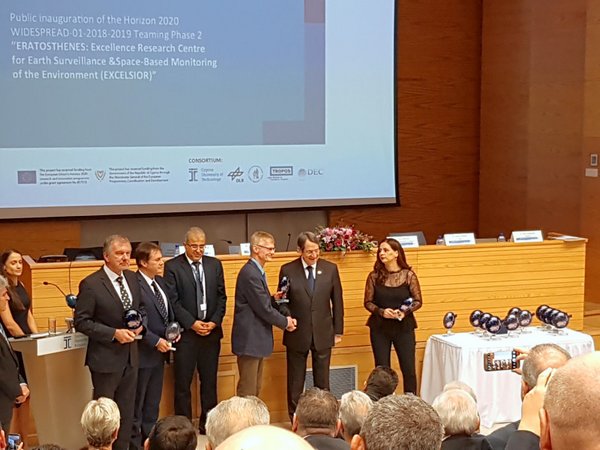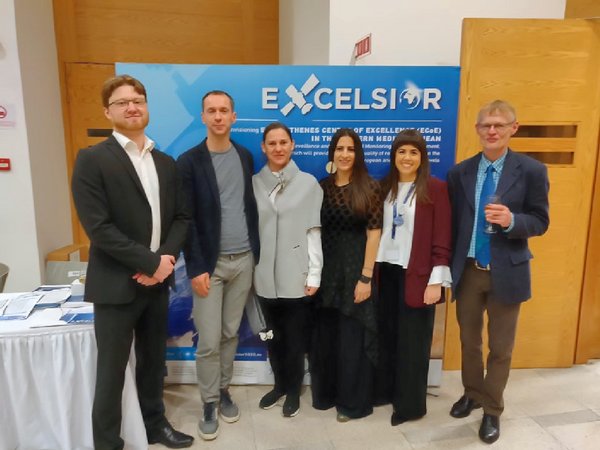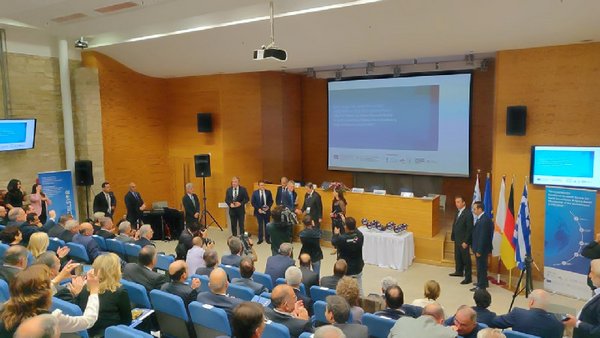In the focus of climate change
Leipzig,
25.11.2019
German remote sensing experts participate in the construction of a new centre in Cyprus.
Limassol. In Cyprus, the ERATOSTHENES Centre of Excellence (ECoE) has been launched to become a leading digital innovation hub (DIH) for Earth observation and geodata over the next seven years. The new remote sensing centre for the Eastern Mediterranean, Middle East and North Africa region will also bring together German experts from TROPOS and DLR to better study global climate change, land use and related societal challenges in the Eastern Mediterranean from space and from the ground: The Leibniz Institute for Tropospheric Research (TROPOS) will set up a ground-based remote sensing system for dust and clouds that will be integrated into worldwide observation networks for aerosols and clouds. The Earth Observation Centre of the German Aerospace Center (Deutsches Zentrum für Luft- und Raumfahrt; DLR) will accompany the construction of a satellite ground station which will enable the reception of data from a wide range of Earth observation satellites and thus more accurate forecasts for this region.
In the EU project EXCELSIOR, a consortium consisting of the Cyprus University of Technology (CUT), the National Observatory of Athens (NOA) in Greece, the Ministry of Transport, Communications and Works (MTCW-DEC) from Cyprus as well as DLR and TROPOS from Germany is supporting the expansion of the Eratosthenes Research Centre at the Cyprus University of Technology into the Eratosthenes Centre of Excellence for Remote Sensing (ECoE). Between 2016 and 2018, the consortium successfully participated in the tender for the EU "Teaming for Excellence" programme. In September, the contract was signed with the Directorate-General for Research and Innovation (DG RTD; unding number: 857510). The President of the Republic of Cyprus, Nikos Anastasiadis, also took part in public inauguration event of the centre in the port city of Limassol at the end of November.
The European Commission is supporting the Centre with €15 million over seven years. DLR and TROPOS each account for around 10 percent of this amount. The Republic of Cyprus will contribute €15 million over 15 years. The Cyprus University of Technology (CUT) is also supporting the project with additional funds.
The new centre will be involved in three thematic areas: Environment and climate (atmosphere, agriculture, water, land), resilience and society (disaster risk reduction, cultural heritage, marine security, energy) and "Big Data" in Earth observation (information extraction, visual exploration, visualisation, crowd sourcing & data fusion, geoinformatics). The aim is to make the ECoE at Limassol an exchange place for researchers from all over the world and a nucleus for a future innovation centre in the Eastern Mediterranean.
Aerosols, which are tiny dust particles in the atmosphere, influence the properties of clouds. They decide, for example, how much solar energy is reflected or when precipitation occurs. These interactions are of great importance for weather and climate. Therefore, TROPOS investigates the relationships between aerosols and clouds in the laboratory, in the model and in nature. In recent years, Cyprus has proven to be of particular scientific interest for field experiments. The island in the eastern Mediterranean lies on the border between the temperate Mediterranean climate and the dry hot desert climate. In addition, dust plumes from wide variety of dust sources arrive here: “Depending on the general weather conditions, polluted air from Europe, sea air or dust from the Sahara or the deserts of the Middle East dominate. The central location in the dust belt of the northern hemisphere makes Cyprus so interesting for us. This dust belt reaches from the Sahara in Morocco in the west to the Taklamakan desert in China in the east. The significance for the global climate is correspondingly great. In addition, Cyprus is not far from large metropolises and we can also investigate the influence of mineral dust on air pollution there," explains Dr. Johannes Bühl of TROPOS.
From October 2016 to March 2018, the Cyprus Clouds Aerosols and Rain Experiment (CyCARE) experiment took place in Limassol. In addition to the Cyprus University of Technology (CUT) and TROPOS, DLR and the Cyprus Institute from the capital Nicosia also participated. TROPOS set up its container system LACROS (Leipzig Aerosol and Cloud Remote Observations System) in Limassol to study the atmosphere from the ground with Raman lidar, Doppler lidar, cloud radar and microwave radiometer. The instruments are currently being used in Punta Arenas (in southern Chile) to observe the atmosphere at one of the cleanest locations in the world. In 2020, a second, identical system will therefore be set up at TROPOS in Leipzig, which will be installed in Limassol together with the Cypriot colleagues in 2021 and will permanently observe the atmosphere in the eastern Mediterranean.
The new stations will later play an important role in the global Earth observation networks. The new ground-based remote sensing station of the ECoE will be integrated into the European Research Infrastructure for Aerosol, Clouds and Trace Gases (ACTRIS), which will investigate these short-lived climate drivers and thus enable better predictions for air quality, weather and climate in the future. Tilo Arnhold
Links:
EXCELSIOR (ERATOSTHENES: EXcellence Research Centre for Earth SurveiLlance and
Space-Based MonItoring Of the EnviRonment / ECoE):
https://www.excelsior2020.eu/
Cyprus Clouds Aerosol and Rain Experiment (CyCARE):
https://www.tropos.de/en/institute/departments/remote-sensing-of-atmospheric-processes-new/ground-based-remote-sensing/cyprus-clouds-aerosol-and-rain-experiment-cycare
The Leipzig Aerosol and Cloud Remote Observations System LACROS
https://www.tropos.de/en/research/projects-infrastructures-technology/coordinated-observations-and-networks/lacros
Current data from LACROS:
http://lacros.rsd.tropos.de/
CLOUDNET:
https://www.tropos.de/en/research/projects-infrastructures-technology/coordinated-observations-and-networks/cloudnet
Contacts:
Dr Johannes Bühl, Dr Patric Seifert, Dr Ronny Engelmann
Scientific staff, Department „Remote Sensing of Atmospheric Processes“ at the Leibniz Institute for Tropospheric Research (TROPOS), Leipzig, Germany
Phone +49-341-2717-7312, -7080, -7315
https://www.tropos.de/en/institute/about-us/employees/johannes-buehl
https://www.tropos.de/en/institute/about-us/employees/patric-seifert
https://www.tropos.de/en/institute/about-us/employees/ronny-engelmann
and
Dr Albert Ansmann
Leader of the Working Group Ground Based Remote Sensing, Department „Remote Sensing of Atmospheric Processes“ at the Leibniz Institute for Tropospheric Research (TROPOS), Leipzig, Germany
Phone: +49-341-2717-7064
https://www.tropos.de/en/institute/about-us/employees/albert-ansmann
or
Tilo Arnhold
Public Relations at the Leibniz Institute for Tropospheric Research (TROPOS), Leipzig, Germany
Phone: +49-341-2717-7189
https://www.tropos.de/en/current-issues/press-releases




